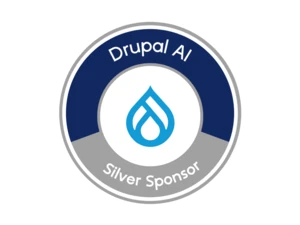Drupal 11 Released - Key Features and Modernised Technology
Drupal 11 was released on August 2, 2024, introducing a suite of new features and enhancements aimed at improving functionality, performance, and user experience. In this article, we will highlight the most significant updates, and emphasise the importance of ongoing maintenance for your Drupal sites.
Drupal 11 vs. Drupal 10.3
Before upgrading to Drupal 11, your site must first be updated to Drupal 10.3. Released on June 20, 2024, Drupal 10.3 incorporates nearly all the features of Drupal 11 while maintaining backward compatibility.
- Both Drupal 10.3.2 and 11.0.0 offer the same public APIs, allowing modules and themes to remain compatible across both versions.
- Deprecated modules and themes (e.g., Actions UI, Book, Forum) have been removed in Drupal 11.
- Drupal 11 has updated dependencies and revised platform requirements for PHP, databases, and browsers. The minimum PHP version for Drupal 11 is 8.3, while Drupal 10 recommends using PHP 8.1.6.
- Some features that were experimental in Drupal 10.3 are now stable in Drupal 11, such as, Single Directory Components (SDC) and Workspaces module.
Key Features of Drupal 11
-
Recipes
- Provides pre-configured feature sets to simplify adding new functionality to your site.
- Offers more flexibility compared to traditional installation profiles.
- Plays an important role in the Starshot initiative, enabling rapid setup for common web use cases.
-
Modern Technology Stack
- With support for PHP 8.3 and Symfony 7, Drupal 11 leverages the latest technological advancements. This modern stack enhances security features, improves code quality, and promotes adherence to secure coding practices.
-
Enhanced Administration UI
- Introduces an experimental Navigation module that features a a modern, collapsible, and customizable vertical toolbar.
- Offers intuitive navigation with quick links to streamline content creation.
- Enhances the user experience by providing clearer section names and improved navigation blocks.
-
Single Directory Components (SDC)
- Now stable and included in the core, Single Directory Components simplifies front-end development by consolidating all files needed to render an interface component into a single directory.
- Simplifies front-end development by making it easier to locate, reuse, and create components.
-
Workspaces
- The Workspaces feature enables effective content staging by allowing multiple changes to be published simultaneously.
- Facilitates better collaboration and content management across teams.




-
Flexible Access Policies
- Introduces an Access Policy API for advanced, context-aware access control.
- Allows permissions to be configured based on factors such as time of day, URL, or specific content attributes.
-
Performance Enhancements
- Offers improved caching mechanisms and optimised database queries.
- Enhances the handling of JavaScript and CSS for better overall performance.
-
Field UI
- Simplifies creating and reusing fields with a more intuitive interface, visual field type selection, reduced setup steps, improved field grouping, and the ability to reuse fields across multiple content types. These changes enable quicker configuration and maintain consistency across complex sites.
- Features more prominent action buttons, better control over text formats, unified revision editing for easier version management, and an efficient floating action bar for bulk operations. These improvements make managing content more user-friendly and efficient.
-
Additional Noteworthy Features
- Enhanced content moderation workflows, now extending moderation capabilities to include taxonomy terms.
- Drupal 11.1 introduces the option to implement hooks as methods within a class, registered using the #[Hook] attribute and automatically set up as services through autowiring. For backward compatibility, the traditional procedural approach remains available.
-
Upcoming Features
- Ongoing development of automatic update functionality. Although still being finalised, the automatic updates feature aims to apply critical security patches swiftly, thereby reducing the risk of exposure to potential threats.
- The Project Browser facilitates finding and adding modules.

Why Upgrade Drupal for Long-Term Success
- Regular maintenance is important to keep Drupal websites secure, fast, and optimised. By regularly updating the Drupal core, users benefit from ongoing support, timely security patches, bug fixes, and compatibility with new technologies, thereby extending the site's operational lifespan.
- Major versions are released every two years during even-numbered years, with each version supported for at least four years until two newer major versions are available. Overlapping support between major versions makes upgrades easier and provides flexible options for planning.
- Ongoing updates often bring improvements in accessibility and data protection standards, such as GDPR and WCAG, helping you meet regulatory requirements and provide an inclusive experience for all users.
How drunomics can help moving to D11:
At drunomics, we are ready to assist organisations in smoothly transitioning to Drupal 11. Our team ensures the upgrade process is efficient and straightforward.
Our services include:
- Upgrade Support: We manage all phases of the upgrade, from planning through to deployment, minimising potential downtime and reducing risk.
- Continuous Maintenance: We provide ongoing support to keep your Drupal 11 site secure and running smoothly, including applying security patches, updating modules, and monitoring performance.
- Efficient Upgrades: With our cloud distribution, major version updates are handled as part of routine updates, leading to lower costs for clients. More information is available at mossbo.
- Strategic Consultation: We offer expert advice to help you make the most of Drupal 11's new features, enhancing your site's functionality and user experience.
By partnering with drunomics, you ensure your Drupal 11 site remains secure, and up-to-date.
RESOURCES
https://www.drupalpartners.com/blog/preparing-drupal-11-best-practices-upgrading-drupal-9-or-10
https://dev.acquia.com/blog/drupal-11-preparation-checklist
https://dev.acquia.com/drupal11
https://imagexmedia.com/blog/drupal-11-released-whats-new
https://www.drupal.org/project/drupal/releases/11.0.0
https://www.drupal.org/about/core/policies/core-release-cycles/release-process-overview
https://www.drupal.org/docs/getting-started/system-requirements/overview
https://attia-it.com/blog/hooks-implementation-drupal-11-new-oop-approach





